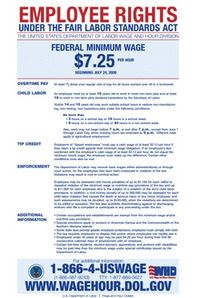Should every worker receive a living wage?
There are movements in many states to raise legislated minimum wages up to levels that will support American families. Examples abound in Washington state, Massachusetts and Missouri. The District of Columbia has also signaled that a living wage is necessary for Walmart, even as unions maneuver to avoid the issue.
Some businesses also claim to support “a Fair Minimum Wage.” That phrase bothers me, because it seems that fair always means “more.” I’ve only known one person who has ever argued that, “in order to be paid fairly, I should be paid less.” And he was supremely talented, if modest.
The ripple effect to minimum wage increases
A “living wage” would greatly exceed $7.25 an hour. Pundits who have never met a payroll see no particular implications from massive increases to the U.S. federal minimum wage. Moving the minimum floor rate from $7.25 to $10 an hour would mean a 40 percent increase; going to $12 an hour is a 65 percent increase; and, hitting $12.50/hr would be more than a 72 percent jump.
No big deal, proponents casually proclaim, citing a labor center study saying that if all minimum wage Walmart employees were raised to $12/hr, it would not translate to much of a price increase for the average shopper. But what if EVERY Walmart employee were granted the same proportional increase?
 There is a ripple effect to minimum wage increases. Please note, those already paid above the old minimum wage would immediately argue that they each should be granted either the same absolute increase (dollars and cents more) or the same relative percentage (relative percentage increase from minimum rate to the new rate).
There is a ripple effect to minimum wage increases. Please note, those already paid above the old minimum wage would immediately argue that they each should be granted either the same absolute increase (dollars and cents more) or the same relative percentage (relative percentage increase from minimum rate to the new rate).
Those veteran workers hired years ago at $8/hr who now make $10/hr would bristle at being paid less than the most recently hired lowest-seniority worker, so EVERY Walmart worker making less than upper management salaries would expect and demand an equity increase. That would cost a whole lot more than 46 cents a shopping trip.
Should high schoolers be paid the same as parents?
Forbes had a temperate and thoughtful article about how the DC “living wage” conflict shows the relative weakness of retailers, but the media coverage tends to overlook the different purposes of a Minimum Wage versus a Living Wage.
Every single worker does not support a family all by themselves. Why should high school kids still living at home be paid as if they were their parents? It makes sense to have a minimum entry rate for unskilled workers without any particular talents or experience to offer.
Hiring at a discounted hourly rate showing their relative lack of productive value, employers can afford to train the unskilled, build their abilities and develop their experiences so the trainees can command sufficient income to support a family. Artificially inflating the minimum wage beyond its economic equilibrium point will remove the incentive for companies to hire novices when they must pay them the same as experienced candidates.
People have to start somewhere. Continuums exist for a reason — to show scale and to permit relative differentiation.
Is this about better jobs, or better candidates?
Those who have worked at minimum wage levels for years have experienced the painful process of creating personal employment value. Companies are willing to pay for better KSAs (knowledge, skills, ability), but should every employer be required by law to pay more than they feel is proper? Does our economy need better jobs or better candidates?
Better pay tends to flow to better prepared workers. Should that change? If more money flows to the least valuable people, what happens to the better qualified talent?
These are important questions that should be addressed by the total rewards community rather than by politicians. Otherwise, the answers will be dictated by legislators.
This was originally published at the Compensation Café blog, where you can find a daily dose of caffeinated conversation on everything compensation.
